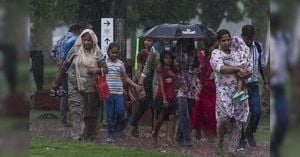The Premier of Victoria, Jacinta Allan, is set to lead a significant trade mission to China in September 2025, marking her first official visit to the country as the state's leader. This mission aims to strengthen economic ties and explore new opportunities amid ongoing trade disputes and a complex geopolitical landscape.
Allan emphasized the importance of this visit, stating, "We will meet with businesspeople, government officials, educators, and communities to further enhance the friendship between the people of Victoria and the Chinese people." She expressed pride in this relationship, highlighting that the trip is an opportunity to turn a new page and for Victoria to take a leadership role in fostering connections.
During the mission, Allan plans to unveil a new strategy for Victoria's engagement with China, focusing on five key areas: food and fiber, advanced manufacturing and clean energy, medical technology and pharmaceuticals, tourism and creative industries, and international education. She noted, "These are the sectors where we excel. This is our source of growth and our offering to the Asian market, based on our greatest assets: our people and our diversity."
Allan also addressed the negative rhetoric that has emerged in recent years, particularly from conservative politicians, which she believes has hurt Chinese families in Australia. "In a time of tariffs and global economic uncertainty, I want to seize the opportunity for Victoria to create good, stable jobs and promote strong economic growth," she said.
In a pointed remark, she referenced the divisive rhetoric associated with former U.S. President Donald Trump, stating, "As Premier, I am not closing the door on economic opportunities. I welcome them with open arms." This comment reflects her commitment to fostering a positive and inclusive economic environment.
Allan's upcoming visit follows a controversial trip made by her predecessor, Daniel Andrews, who faced criticism for not allowing media to accompany him during a four-day official visit to China in March 2023. That trip, which was Andrews' seventh to China as Premier and the first since the COVID-19 pandemic, reportedly cost taxpayers $82,716.
Victoria's ties with China were significantly strengthened in 2019 when the state signed an agreement under the "Belt and Road" initiative, aimed at increasing the involvement of Chinese companies in Victoria's infrastructure programs. However, this agreement was canceled by the Morrison government in March 2021, citing concerns that it was inconsistent with Australia's foreign policy and detrimental to external relations.
Since then, under the leadership of Prime Minister Anthony Albanese, Australia has entered a new phase in its relations with China, although challenges remain. Notably, the Labor Party's commitment to negotiate the termination of the 99-year lease of the Darwin port by Chinese company Landbridge could introduce further complications.
As Australia navigates the ongoing U.S.-China trade war, it finds itself balancing its largest security ally, the United States, with its biggest trading partner, China. This trade mission is viewed as an attempt to repair relations and capitalize on economic opportunities amid these complexities.
In related news, recent reports indicate that China is increasing its wheat imports due to drought conditions threatening its agricultural output. According to traders, Chinese buyers have recently purchased between 400,000 and 500,000 metric tons of wheat from Australia and Canada, with concerns that the ongoing heatwave could severely impact local crop yields.
Henan Province, which produces about one-third of China's wheat, has issued warnings regarding the adverse weather conditions affecting its crops. As part of this surge in imports, Chinese traders have arranged for the delivery of approximately 55,000 tons of Australian wheat and 200,000 tons from Canada, with shipments expected in July and August. The imported wheat is primarily intended for milling.
China remains one of the world's largest wheat importers, with expectations to import around 11 million tons in 2024, valued at approximately $3.5 billion USD. Australia and Canada are typically the largest suppliers of wheat to China; however, shipments have slowed significantly since last year due to high domestic yields.
In a further development, there are indications that Chinese importers are avoiding U.S. wheat due to tariffs and the ongoing trade tensions between Washington and Beijing. Previously, China was a major destination for U.S. wheat sales, but this dynamic has shifted in light of the current trade climate.
Additionally, Chinese buyers have also secured substantial quantities of barley, with reports suggesting that six bulk carriers transporting approximately 360,000 tons of new crop barley from France or Ukraine have been sold for delivery this summer. Some estimates suggest that the total volume could be as high as 1 million tons.
As both Victoria and China navigate their respective economic landscapes, the upcoming trade mission by Jacinta Allan represents a pivotal moment in strengthening bilateral ties and addressing the challenges posed by external pressures and internal strategies. The outcomes of this mission could have lasting implications for Victoria's economic future and its relationship with one of its most significant trading partners.




